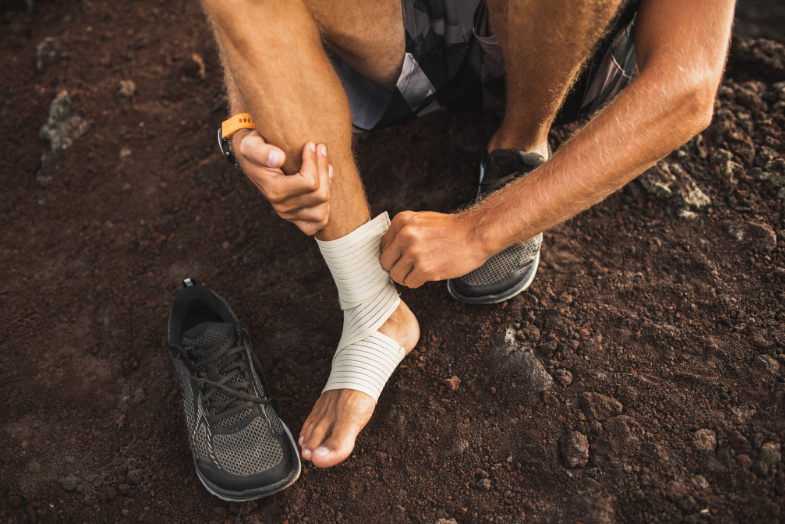How to Treat Achilles Tendinitis
Your Achilles tendon does not need to be your Achilles heel. Learning how to treat Achilles tendonitis is the first step to relieving your pain. Achilles tendonitis treatment is simple and effective if under the direction of a professional. In this article, you will learn how to treat Achilles tendonitis, what causes Achilles tendonitis, and how a brace can help Achilles tendinitis.
Achilles Tendinitis Treatment
Achilles tendonitis is very common. Your doctor will know what to look for and how to treat it so you can get back to your daily life. It will take time and patience as healing takes time and not every treatment will not work for everyone. Below are some common Achilles tendinitis treatments.
 Rest
Rest
Achilles tendinitis is an over-use injury. Taking a break from whatever caused the pain is a simple Achilles tendinitis treatment. Ceasing the use for a limited amount of time can give your body enough time to deal with the inflammation without you re-aggravating the injury.
Just because you are on rest does not mean that you have to cease all activity. You just need to switch from high-impact exercises like running to low-impact exercises.
Ice
Ice your ankle as needed. Ice helps reduce pain and inflammation. Though it is not a permanent solution, it is a great addition to other Achilles tendinitis treatments.
Physical Therapy
A physical therapist can give you a variety of exercises to incorporate into your Achilles tendonitis treatment plan. They can supervise you as you complete the exercises to stretch and strengthen your leg and foot muscles. This helps prevent mistakes that can cause further injury. Here are some examples of exercises that a physical therapist might have you do for Achilles tendinitis.
Calf Stretch
The calf stretch requires you to place your hands on a wall. One knee should be bent in front of you and the other leg straight behind you. Both feet should be flat on the floor.
Slowly, lean forward into the front foot. You should feel the stretch in your calf and the heel of your back leg. Hold the position for 10 to 20 seconds then return to the beginning position. Repeat the stretch a few times.
Stair Stretch
Stand on a step with your heels hanging halfway off the edge. Hold onto something solid like the railing for balance. Let your afflicted heel hang off the edge of the step until you feel a stretch in your heel and the back of the leg. The leg you are stretching needs to remain straight for this stretch to be effective.
 Supportive Shoes
Supportive Shoes
The quality of the shoes you wear has a large effect on the well-being of your feet. Shoes with a lower back and heel lift can reduce irritation of the Achilles tendon. Orthotics also help. custom orthotics allow your shoes to hug your arch. Whether you have flat feet, high arches, or anything in between, an orthotic will give you pain-relieving support.
Debridement
Sometimes surgery is the best Achilles tendinitis treatment option. Debridement is surgery to remove bone spurs and damaged tendon tissue. If too much tissue is removed, the surgeon will take a tendon from somewhere else, such as from the big toe, and attach it to the heel.
Gastrocnemius Recession
Gastrocnemius Recession is a surgical Achilles tendinitis treatment option. This surgery lengthens the tendon to relieve tightness. Patients who have trouble flexing their feet despite continued stretching might need this surgery.
Sore Achilles Tendon
The Achilles tendon is the tendon that connects the calf muscle to the heel bone. Tendonitis refers to inflammation or irritation of a tendon. When the Achilles tendon becomes irritated, often through overuse, you develop Achilles Tendinitis.
A sore Achilles tendon is a signal that you are suffering from Achilles tendinitis. A mild ache in the back of the leg or just above the heel after physical activity is usually the first indication that something is wrong.
Achilles tendinitis is an overuse injury. Over time and with more use, the sore Achilles tendon can get worse and make it difficult to walk. If the pain becomes debilitating it could mean that you have torn your Achilles tendon. Though there are some non-surgical options, surgery could be required to treat a ruptured Achilles tendon.
Learning how to treat Achilles tendonitis can prevent Achilles tendinitis from reaching the point of rupture.
Achilles Tendonitis Brace
A doctor might recommend Achilles tendinitis bracing in addition to other Achilles tendonitis treatment options. Some patients may need to consistently brace for a few weeks while others might find success only bracing at night. There are different types of braces that target different aspects and different severities of Achilles tendinitis
 Compression Sleeves
Compression Sleeves
Compression sleeves are a type of brace that can be used to help Achilles tendonitis. As the user wears them, the compression sleeve pulsates increasing blood flow and reducing swelling.
Walking Boots
Walking boots keep the foot at a 90-degree angle. The foot and tendon will remain in the same position throughout the day. These Achilles tendinitis braces keep you from moving and aggravating your Achilles tendon. If your doctor recommended rest, they might also recommend that you wear a walking boot.
Night Splinting
An Achilles tendonitis brace for night splinting can relieve morning pain. Night splinting keeps the toes pointing upward and your foot in place throughout while you sleep. This Achilles tendonitis brace helps maintain calf flexibility and decreases the pull of the Achilles tendon on the heel.
Help For Achilles Tendinitis
Do not suffer from Achilles tendonitis. A doctor from the Foot and Ankle Specialists of Illinois (FASI) is prepared to help you heal from Achilles Tendonitis. We understand how debilitating foot pain can be and we understand that you want to get better as soon as possible. Our expert podiatrists can diagnose you using the latest technology, give you the advice, and the treatment options you need to restore your foot health. Contact the Foot and Ankle Specialists of Illinois (FASI) if you have any questions or would like to schedule an appointment.

